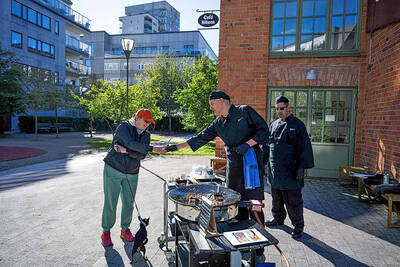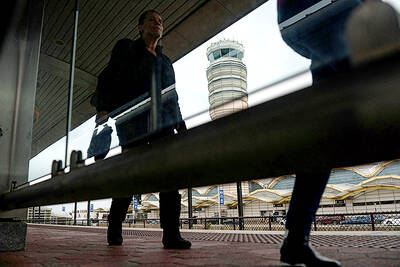One of the world's most authoritarian and reclusive leaders, Saparmurat Niyazov of Turkmen-istan, has canceled payments to a third of the country's pensioners and cut those of hundreds of thousands more in a move that threatens to spark widespread popular protest.
Niyazov, considered as eccentric as he is despotic, has led the central Asian state since 1985 and retains a tight control over its economy. Yet the move, part of a wider crackdown on state benefits introduced on Wednesday, ends state maternity and sick leave payments and cancels pensions paid to 100,000 senior citizens.
An official for the social security ministry said that many of the remaining 229,000 pensioners would receive payments less than the current provision of US$10 to US$90 a month.
He said a review of pensions had found they were inflated, particularly those of farmers. Employers, not the state, would now have to make sick and maternity leave payments.
The move, which will directly affect the most vulnerable citizens of the region's most impoverished state, has been attributed to shortcomings in the state pension fund that forced Niyazov to siphon hard cash from currency reserves to meet the benefits bill last year.
Turkmenistan is rich in gas and oil and has used state energy revenues to maintain Niyazov's fiefdom. But the cash has apparently begun to run short; Turkmenistan is hoping to raise the price of the gas it sells to Russia and Ukraine.
Niyazov has avoided the critical glare of the international community, his benign dictatorship appearing relatively harmless when compared to the efficient brutality of neighboring Uzbekistan.
Niyazov, 65, likes to be referred to as Turkmenbashi, or "the leader of all Turkmen," and has renamed both a town and the month of January after this title. He has also renamed April -- and bread -- after his late mother.
He has reportedly banned gold teeth, smoking, video games, recorded music, lip-syncing to songs, makeup on newscasters, young men from growing beards or long hair and anyone from owning more than one cat or dog. Doctors swear allegiance to him and licensed drivers have to take a morality test.
But the direct economic hardships of the pension reform risk fomenting serious protest.
Opposition activist Batir Mukhamedov, in Moscow, claimed that in Krasnovodsk, now named Turkmenbashi, pensioners had marched on the local administration to demand an explanation, and some had committed suicide.
Niyazov declared himself "president for life" in 1999, using parliament to rubber-stamp the move. Turkmenistan is cut off from the rest of the world through a restrictive visa regime and tight media controls, but US insistence on democratic values may have been behind the surprising decision last year to declare free elections in 2010.
Last year, Pentagon officials made repeated visits to the capital Ashgabat, denying reports they were negotiating a US military base in the country, having been thrown out of Uzbekistan.

READINESS: According to a survey of 2,000 people, 86 percent of Swedes believe the country is worth defending in the event of a military attack Swedes are stocking up on food items in case of war, as more conflict in Europe no longer feels like a distant possibility, and authorities encourage measures to boost readiness. At a civil preparedness fair in southwest Stockholm, 71-year-old Sirkka Petrykowska said that she is taking the prospect of hostilities seriously and preparing as much as she can. “I have bought a camping stove. I have taken a course on preservation in an old-fashioned way, where you can preserve vegetables, meat and fruit that lasts for 30 years without a refrigerator,” Petrykowska said. “I’ve set aside blankets for warmth, I

FRUSTRATIONS: One in seven youths in China and Indonesia are unemployed, and many in the region are stuck in low-productivity jobs, the World Bank said Young people across Asia are struggling to find good jobs, with many stuck in low-productivity work that the World Bank said could strain social stability as frustrations fuel a global wave of youth-led protests. The bank highlighted a persistent gap between younger and more experienced workers across several Asian economies in a regional economic update released yesterday, noting that one in seven young people in China and Indonesia are unemployed. The share of people now vulnerable to falling into poverty is now larger than the middle class in most countries, it said. “The employment rate is generally high, but the young struggle to

ENERGY SHIFT: A report by Ember suggests it is possible for the world to wean off polluting sources of power, such as coal and gas, even as demand for electricity surges Worldwide solar and wind power generation has outpaced electricity demand this year, and for the first time on record, renewable energies combined generated more power than coal, a new analysis said. Global solar generation grew by a record 31 percent in the first half of the year, while wind generation grew 7.7 percent, according to the report by the energy think tank Ember, which was released after midnight yesterday. Solar and wind generation combined grew by more than 400 terawatt hours, which was more than the increase in overall global demand during the same period, it said. The findings suggest it is

IN THE AIR: With no compromise on the budget in sight, more air traffic controllers are calling in sick, which has led to an estimated 13,000 flight delays, the FAA said Concerns over flight delays and missed paychecks due to the US government shutdown escalated on Wednesday, as senators rejected yet another bid to end the standoff. Democrats voted for a sixth time to block a Republican stopgap funding measure to reopen government departments, keeping much of the federal workforce home or working without pay. With the shutdown in its eighth day, lines at airports were expected to grow amid increased absenteeism among security and safety staff at some of the country’s busiest hubs. Air traffic controllers — seen as “essential” public servants — are kept at work during government shutdowns, but higher numbers